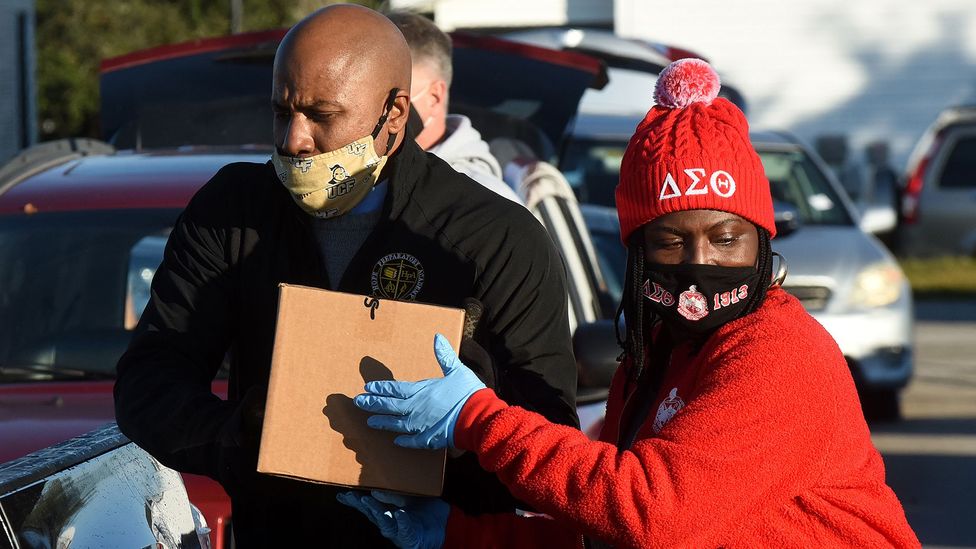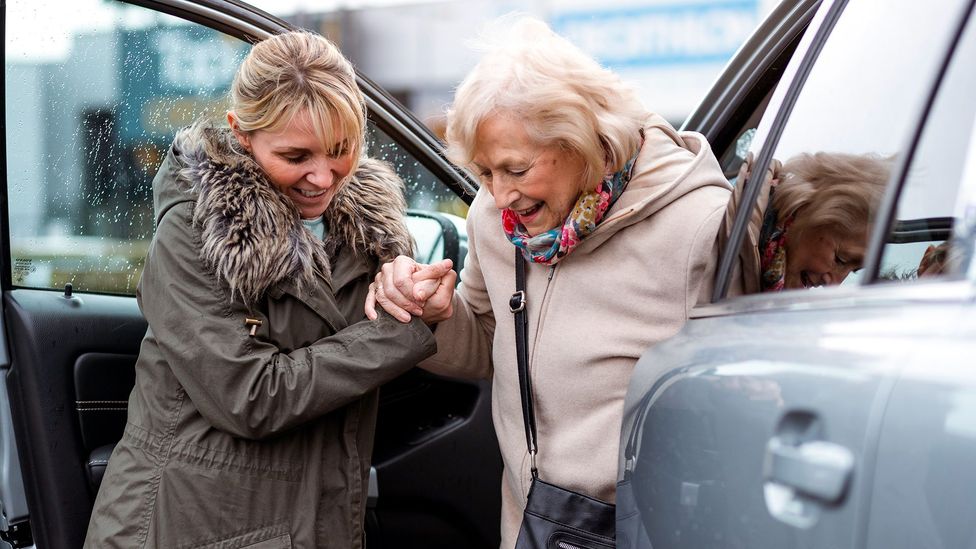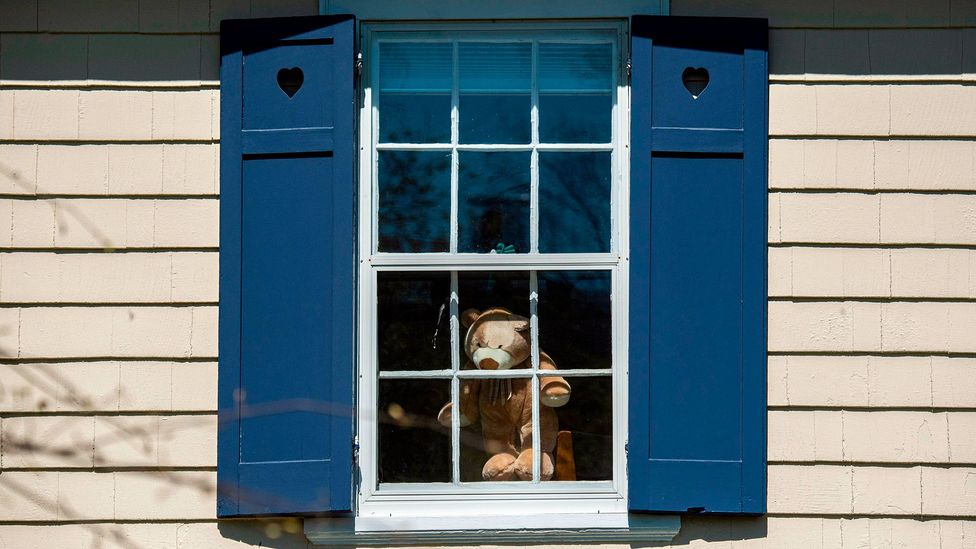When you most need to get happier, try giving happiness away.
Arthur C. Brooks
“How to Build a Life” is a weekly column by Arthur Brooks, tackling questions of meaning and happiness.
Norman Rockwell painted some of the most iconic images of 20th-century America. His paintings, such as Rosie the Riveter and the Four Freedoms series from World War II, and The Problem We All Live With and Murder in Mississippi from the civil-rights movement, were intended to evoke the best in people who saw them: hope, solidarity, courage, justice—but most of all, happiness. The bulk of his work captured scenes of lighthearted joy. Consider Shiner, which depicts a young girl with a black eye, sitting outside the principal’s office with a grin that tells you she has just been the victor in combat.
I have seen these paintings my whole life, starting with my grandfather’s beloved, dog-eared coffee-table book of Rockwell’s greatest works. A printing-press operator in Longview, Washington, my grandfather was no art connoisseur. But he gave this assessment of Rockwell: “These pictures make me feel happy.”
And yet, Rockwell himself struggled with happiness. In 1953, he moved to Stockbridge, Massachusetts, a bucolic town in the Berkshires—not for its natural beauty and peace but because it happened to be the home of a psychiatric hospital where he and his wife could receive treatment for chronic depression. There, he was a patient of the world-famous psychoanalyst Erik Erikson, with whom Rockwell racked up a therapy bill so large that he had to accept commissions for Kellogg’s Corn Flakes magazine ads.
That a man with such significant happiness problems would be known for painting images of undeniable happiness might seem ironic. In truth, it’s not strange at all. Research shows not only that you can bring joy to others even if you’re unhappy, but also that doing so is a reliable way to improve your own well-being, too. That doesn’t come naturally to most of us, however, to our detriment. To make a change, we can start by understanding how the process works, so we can build better habits and consciously commit to giving happiness when we most need to get it.
Few of us want our negative moods to drag others down. But in practice, a lot of people follow a theory of happiness that can be summed up in the famous line from airline-safety videos: “Put on your own mask before assisting others.” In other words, you can’t make others happy unless and until you are happy yourself. I get the reasoning: Unhappy people often bring wretchedness to those around them. Think of the most miserable boss you’ve had, and you’ll know what I mean.
This belief is backed up by research. As Lane Wallace wrote in The Atlantic in 2011, longitudinal studies of families show that one person’s unhappiness can be “poison” to others in close proximity. Wallace noted that women married to unhappy men tend to be unhealthier and live shorter lives than those married to happy men; children whose mothers have a happy marriage are 18 percentage points more likely to be happy at home than those with mothers in an unhappy marriage. Misery loves company, according to the old adage—and untreated, it creates company too.
Read: The poison of unhappiness
None of us wants to be the purveyor of poison, especially toward those we love. Fortunately, research also shows that we have more control over how we affect others—and ourselves—than we might assume. The key is to act like a happy person would, even if you don’t feel like it.
Last year, researchers at the University of California at Riverside asked human subjects to behave in either extroverted or introverted ways for one week. They found that those purposively acting extroverted—which decades of research have shown is one of the most common characteristics of happy people—saw a significant increase in well-being. (Meanwhile, acting introverted led to a decrease.) Similarly, spending money on others and volunteering have both been shown to raise one’s own happiness levels.
One plausible explanation for why this works is that prosocial behaviors induce a cognitive dissonance—I feel unhappy, but I am acting happy!—which people resolve subconsciously by feeling happier. Richard Wiseman, a psychologist at the University of Hertfordshire, in the United Kingdom, calls this the “As If Principle”: If you want to feel a certain way, act as if you already do, and your brain will grant you that feeling—at least for a while. In common parlance, “Fake it ’til you make it.”
Read: People seek out a certain kind of person when they are happy
I am not suggesting here that “Fake it ’til you make it” is a substitute for traditional medical treatment for depression, of course. Norman Rockwell, for instance, was in formal therapy most of his adult life. But his happy paintings were clearly part of his treatment. As Rockwell’s biographer Deborah Solomon points out, “He was painting … his longing.”
So paint your longing. Even if not literally, you can use the Rockwell formula in your own life to bring more joy to yourself and the people around you when you are down.
First, ask what happy people in your life situation would do to make things better for themselves and others. How would they greet others in the first Zoom call of the day? How would they write an email? Whom would they call just to check in? If you’re stuck, interview happy people you know about the little things they do for their acquaintances and loved ones.
Read: The personality trait that makes people feel comfortable around you
Next, make a plan to follow through on everything you just imagined, and commit to it. Write three ideas for extra-kind greetings on a Post-it note and stick it below your computer screen before that Zoom call. Draft a sample email in the voice of a happy person, and use it as a template. Make a list of friends and family with whom you’re overdue for a chat, and schedule those calls in your planner.
These steps aren’t a set of direct happiness adjustments; they’re more of a bank shot. By deliberately preparing yourself to cheer up the people around you the way a happy person spontaneously would, you’ll create the conditions by which you can produce your own happiness naturally—and give the gift of happiness to others, as well.




